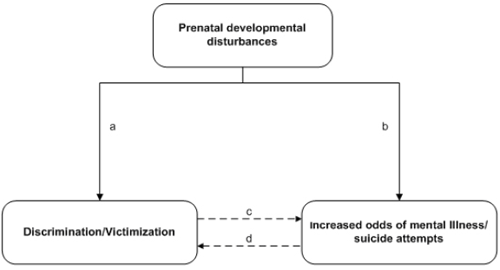The claim that discrimination and prejudice are responsible for the elevated mental health problems of homosexuals is largely vacuous. Prejudice and discrimination likely do not make more than a small contribution to psychiatric morbidity among homosexuals, especially in the Netherlands and Scandinavia. It appears that homosexuality by itself is associated with increased psychiatric morbidity.
A simplified model of the relationship between homosexuality and increased odds of mental illnesses, based on the evidence presented in this section as well as considerable additional evidence presented in a book, is depicted in Fig. 1 below. The mediating roles of family/friends and factors contributing to discrimination against homosexuals such as religiosity or equivalent are not included for simplicity. Solid connectors represent a strong influence and dashed connectors represent a weaker influence. The model argues that the increased odds of mental illnesses seen among homosexuals are largely a result of the prenatal developmental disturbances that cause homosexuality rather than stigma or discrimination or victimization.

Fig. 1: A simplified model of the relationship between homosexuality and increased odds of mental illnesses.
Notes:
- a = traits (e.g., skinniness in men, overweight/obesity in women) and mannerisms (e.g., sex-atypical mannerisms) that increase the risk of discrimination/victimization.
- b = abnormal brain development.
- c = should be obvious.
- d = unusual behaviors due to mental illnesses/abnormality that increase the risk of discrimination/victimization.
